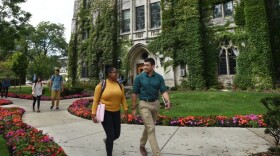On Monday I woke up early, and with my dog Niko by my side, reviewed the hardships the DACA (Deferred Action for Childhood Arrival) recipients I interviewed went through on their trip to the United States. I then read and wrote about the physical threats most immigrants face when crossing the border like heat strokes, dehydration, and rattlesnakes. I also read about the abuses suffered by them in the hands of the local population, authorities, and organized crime. I felt a sense of relief that my interviewees were an average five and a half years of age upon arrival. "Hopefully the trauma is not too bad because they were too young to remember," I told myself.
But they do remember. They remember hiding in bushes, sleeping in dumpsters, pretending to be somebody else’s children, and being separated from their parents for up to five years in one case. Even the ones that came through airports were impacted by the crossing of the border. A young man’s first memory in the United States, for example, was getting lost in O’Hare. Another young fellow remembered feeling weird for having to hug a bunch of strangers upon arrival in Chicago. These strangers were in reality his relatives. As my day progressed, I felt a little down. How does one stay positive when seeing so much human suffering?
The first highlight of my day was the thoughtful email by WIU President Guiyou Huang congratulating the campus for Latinx Heritage Month and inviting us to celebrate this heritage not only this month but also throughout the year. I felt better. “My interviewees,” most of whom were Latinx, “would appreciate this email,” I thought.
But what really changed my day was the email by Amy Crosby, the College of Arts and Science’s Director of Development. She sent a draft of thank you notes for the successful fundraiser to fund undocumented, DACA and Temporary Protected Status students to attend WIU. The fundraiser secured more than $20,000. This last email made sense. THIS is how I can overcome the sadness: work to change the reality I don’t like.
Maybe you’ll think I’m crazy, I know my sister does. While writing my first book about the integration of Mexican immigrants in Beardstown and Monmouth, IL, I learned a lot about the needs of these two communities. They had few civil society groups, if any, no information about their rights, no access to resources, and the list goes on and on. I stayed engaged with them over the years trying to lend a hand in whatever way I could, but I never felt I was able to do enough.
In 2019, I founded the nonprofit Western Illinois DREAMers to assist these two communities and also students of immigrant background at WIU. This nonprofit has multiple projects and informs immigrants about their rights, provides them with assistance, and refers them to resources. One of our projects also provides funds to educate faculty and staff about immigrants and immigration at WIU.
The nonprofit also initiated the fundraiser. I know I can’t change the past. The traumatic memories that the undocumented youth I interviewed have will not be magically washed away with money. But the fundraiser will bring three or four youth closer to achieving their college dream. And maybe as importantly, it will make them feel welcome at WIU.
If you want to contribute to the fundraiser, there is still time to send a check for the WIU DREAMer Scholarship to the WIU Foundation, 303 Sherman Hall, 1 University Circle, Macomb, IL, 61455-1390.
If you want information about the DREAMer scholarship email dreamers@wiu.edu
To celebrate the Latinx Heritage Month with all of us check Casa Latina’s website for a schedule of events.
Julia Albarracin-Green is a Professor of Political Science at Western Illinois University.
The opinions expressed are not necessarily those of the University or Tri States Public Radio. Diverse viewpoints are welcomed and encouraged.






